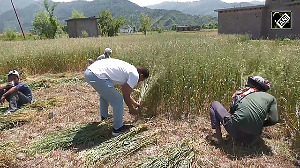Pakistani Prime Minister Zafarullah Khan Jamali said on Tuesday it was time for Pakistan and India to exchange political rivalry for economic cooperation.
Jamali told a conference of donors and lenders in Islamabad that an ice-breaking phone conversation with his Indian counterpart Atal Bihari Vajpayee last month had focused on the need to improve economic ties between the two nuclear rivals.
"You would be surprised," Jamali said. "When I talked to Indian Prime Minister Mr Vajpayee, his first emphasis was economics."
Jamali said he and Vajpayee, in the first high-level contact between India and Pakistan in more than a year, discussed how their economies could develop, but gave no details.
"Things have to change," he said. "How do you change? You don't change by fighting wars. We have had enough of wars, India and Pakistan...the political culture has to change into an economic culture."
Jamali's comments underscored the massive economic and trade benefits the two neighbours could reap by improving relations and resolving their long-running disputes. Pakistan and India have fought three wars, two of them over Kashmir, since gaining independence from Britain in 1947.
Independent economists say their mutual hostility has diverted crucial development funds to defence spending, leaving masses of people in extreme poverty.
"We want development for our people," Jamali told the Pakistan Development Forum, grouping bilateral donors, the International Monetary Fund, World Bank and Asian Development Bank. "We want to give them clean water, we want to give them good health, we want to give them good education."
In the latest sign of a thaw in relations, India named Shivshankar Menon on Tuesday as its new High Commissioner to Pakistan. The two scaled back ties after an attack on India's Parliament in December 2001, which New Delhi blamed on Pakistan-based Kashmiri rebels. Islamabad denied involvement.
Klaus Enders, head of the Middle East Department of the International Monetary Fund, told the conference a reduction in regional tension was a welcome step that could create "tremendous opportunities" for trade and investment.
There is currently no overland trade between the neighbours and trade in many goods is banned. Official bilateral trade via third countries was just $204 million in the year to March 2002.
Economists say the potential for trade is many times this amount should restrictions be lifted, given their combined population of around 115 crores (1.15 billion).
Jamali assured conference participants that Islamabad's programme of economic reform would continue.
Foreign lenders say their key concern about Pakistan, which achieved macro-economic stability during three years of military rule to last October, is that the current elected government will not strictly implement the agreed economic reform plan.








 © 2025
© 2025